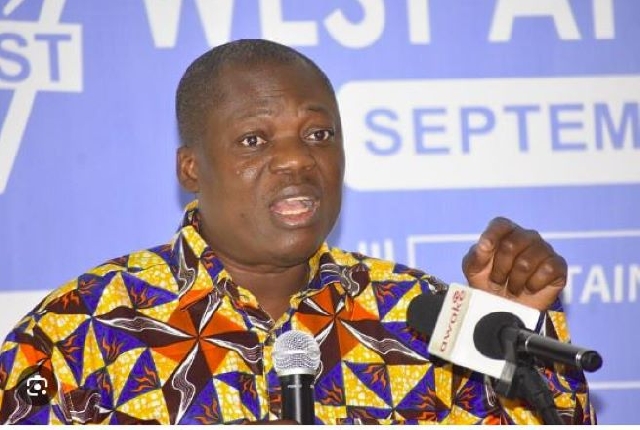Cedi fall: Who’re you crying to? – Gatsi asks Amin Adam for blaming speculation, borrowing
 Prof John Gatsi
Prof John Gatsi
It is not fair for Finance Minister Mohammed Amin Adam to blame currency speculation and the need for more money and the need to borrow more to service Ghana’s debts, for the falling streak of the Ghana cedi, economist Prof John Gatsi has said.
The Ghanaian cedi has depreciated by about 14.6% against the US dollar as of May 2024, the Bank of Ghana said recently.
This is slightly better than the roughly 20% loss in value seen on the retail market.
The Bank of Ghana’s May 2024 Summary of Financial and Economic Data shows the cedi lost 7.7% against the dollar in March 2024 and depreciated by 10.5% in April 2024.
On the retail market, the dollar is averaging GH¢15, while the Bank of Ghana quotes it at GH¢13.01.
Against the British pound, the cedi has fallen by 14.5%, trading at GH¢17.70. It has also lost 12.9% against the euro, with a current rate of GH¢15.07.
Finance Minister Mohammed Amin Adam assured on Friday, May 24, 2024, that the government is collaborating with the Bank of Ghana to address the cedi's depreciation.
Measures include accelerating fiscal consolidation by rationalising spending and boosting revenue, intensifying the gold-for-oil programme, and implementing strategic foreign exchange interventions.
Other strategies involve enhancing the gold-for-reserve programme, disbursing the third tranche under the International Monetary Fund-supported programme after its June 2024 review, and securing funds from ongoing projects, such as a $150 million World Bank loan and an anticipated $300 million World Bank disbursement in the third quarter of 2024.
Despite recent challenges, the pressure on the cedi has eased due to improved foreign exchange liquidity, particularly in US dollars.
Last week, the Bank of Ghana intervened significantly, injecting about $59 million into the spot market and auctioning $20 million to Bulk Oil Distribution Companies, stabilising the currency for now.
However, the Dean of the Business School of the University of Cape Coast said the reasons being blamed by the minister of finance for the cedi’s troubles, are not “fair points”.
In an interview with Kwame Dwomoh-Agyemang on the Class Morning Show on Monday, 27 May 2024, Prof Gatsi said: “Those things are just statements that we make to shift the blame to other people”, explaining: “If you go to UK, they are not even interested in carrying their money in the US dollar, not even in any other currency like the euro and the rest. If you go to South Africa, it’s the same. Go to Rwanda, the same. Why are people trying to invest in the dollar? It is because the confidence around our cedi is not strong, so, the moment they see rampant and continuous depreciation, then they want to find alternatives to invest in, so, they go into buying the dollar as a means of investment vehicle”.
“So, to claim that [speculation] is the reason, then it means that you need to make sure there is confidence surrounding your currency but you cannot just continue to be saying it’s because of speculation. Why did the people speculate? You need to solve that,” Prof Gatsi noted.
On borrowing to pay debts, Prof Gatsi said: “Yes, that one the finance minister should know that if you are borrowing and you are not using the money to develop the country; you’re not using the money to create assets for the country and you need to refinance, that is to say, borrow more money to pay the existing debt, you’ll get to a point where that will not work again and it creates problems for you and that was the whole issue about the debt crisis that we went into”.
“So, you know; you’re the one who has been going to the market to borrow and you know that the revenue that you’re raising is not enough to pay the debt, therefore, you don’t use your misapplication of the rules concerning borrowing to say that now you need more money to … who are you crying to? That is what you need to know when you are borrowing. So, those are not points that show us that the finance minister has a grasp of what it takes to solve the problem.”
Explaining the effects of the depreciation, Prof Gatsi said: “It has the potential to erode incomes of individuals and businesses. It disrupts and truncates the purchasing power of people. It erodes business capital and makes the general cost of living very expensive for all classes of people”.
In addition, he said: “It also increases the debt portfolio in Ghana cedi terms for the government of Ghana. It also may cause some increases in revenue for the government, especially at the entry ports because when the duties are charged in dollars and they are translated or exchanged into Ghana cedis, that means more money for the government but this benefit is not something that we should talk about because it is defeated by all other negative effects of the depreciation.”
Source: Classfmonline.com
Trending News

Defence Minister donates food items to Ghana Armed Forces
02:59
John-Peter Amewu arrested over botched $2 million SkyTrain deal
13:14
A-G uncovers multi-million dollar properties acquired by former NSB Director-General with state funds
02:47
Ningo-Prampram MP secures emergency water relief, GWCL MD to visit for long-term solution
01:20
Gov't redirecting dedicated funds from Agenda 111 projects – Amin Adam claims
02:03
Collins Adomako Mensah calls for urgent probe into missing 1,300 ECG containers
12:02
Gender Minister and MASLOC CEO support Kumasi fire victims with GHS100k donation
20:55
Eid-ul-Fitr: Mon. Mar. 31, Tues. Apr. 1 declared public holidays
00:12
Adum traders apologise for 'disrespectful' rejection of Muntaka's relief items, appeal for their return
01:06
GA/R: No beds syndrome hits Weija Gbawe Municipal Hospital
11:50



